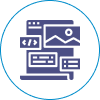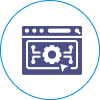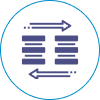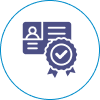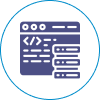1. What are business intelligence and healthcare analytics?
Answer: Business intelligence and healthcare analytics involve the use of data analysis tools and techniques
to gain insights and make informed decisions in the healthcare sector, from patient care to operational
efficiency.
2. How can my company benefit from healthcare analytics?
Answer: Your company can benefit from healthcare analytics by gaining insights into financial performance,
patient outcomes, operational effectiveness, and regulatory compliance, ultimately leading to improved
patient care and organizational success.
3. What kinds of data are employed in analytics related to healthcare?
Answer: Electronic health records (EHRs), clinical data from medical devices, financial data, patient
demographics, and medical claims data are just a few of the data sources that are used in healthcare
analytics.
4. How can healthcare benefit from predictive analytics?
Answer: Healthcare predictive analytics can predict future trends, patient outcomes, and resource
requirements. It makes risk assessment, tailored treatment plans, and preemptive treatments possible, which
improves patient outcomes and lowers costs.
5. What part does a software development business for healthcare play in putting analytics solutions into
practice?
Answer: A software development business specializing in healthcare software designs, builds, and implements
analytics platforms tailored to the unique requirements of healthcare organizations, ensuring smooth
integration with existing systems and adherence to regulatory standards.
6. What constitutes a healthcare analytics platform's essential elements?
Answer: Typically, a healthcare analytics platform consists of decision support systems, interoperability
solutions to enable data interchange across various systems, customizable dashboards and reporting features,
advanced analytics capabilities, and data integration and management tools.
7. How are data security and compliance ensured by healthcare analytics solutions?
Answer: Healthcare analytics solutions place a high priority on data security and HIPAA and other regulatory
compliance. They put strong security measures in place to safeguard private patient data and guarantee
regulatory compliance, such as audit trails, access controls, and encryption.
8. Can healthcare analytics solutions be expanded to handle increasing amounts of data?
Answer: Yes, scalable healthcare analytics solutions are available from respected healthcare software
development companies. These solutions enable them to manage increasing data volumes and adapt to the
changing needs of healthcare institutions.
9. How much time does it take to put an analytics solution for healthcare into practice?
Answer: The complexity of the project, the size of the solution, and the amount of customization needed all
affect how long it takes to develop a healthcare analytics solution. Based on your unique needs, a
healthcare software development business might offer a more precise timeframe.
10. How can clinical decision-making be aided by healthcare analytics solutions?
Answer: At the point of care, healthcare analytics solutions give doctors data-driven decision-making
capabilities that enhance patient safety and results by providing them with real-time insights on patient
diagnoses, treatment alternatives, and clinical outcomes.
11. How are healthcare analytics solutions supported and maintained on an ongoing basis?
Answer: For healthcare analytics solutions, a respectable healthcare software development company provides
continuing support and maintenance services, such as software upgrades, troubleshooting, and technical
assistance to guarantee the platform's sustained dependability and performance.
12. How can my company begin putting healthcare analytics solutions into practice?
Answer: You can speak with a reputable healthcare software development company to go over your demands and
investigate custom software solutions that are suited to your organization's goals before putting healthcare
analytics solutions into practice.








